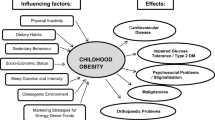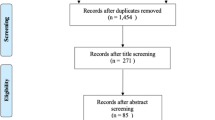Abstract
Purpose
Although weight-loss efforts in non-overweight adolescents and young adults are quite common, the relation between parental and offspring factors related to this behavior remains unclear. This study assessed the parental and offspring factors related to offspring’s weight-loss efforts according to offspring’s weight status.
Methods
Data pertaining to weight-loss efforts and weight status for 1026 families, including 1449 offspring (703 male and 749 female offspring, aged 10–25 years) and 1026 pairs of parents, were derived from the Korea National Health and Nutrition Examination Survey from 2010 to 2013. A generalized estimating equation was used to examine factors associated with offspring’s weight-loss efforts after adjusting for intra-familial correlations.
Results
Weight-loss efforts in adolescents and young adults increased with offspring factors, such as female sex [OR (95 % CI), 2.64 (2.02–3.46)], overweight status [9.54 (6.66–13.67)], weight overestimation [2.96 (2.08–4.20)], and maternal weight-loss efforts [1.37 (1.05–1.79)], while weight-loss efforts decreased with offspring’s weight underestimation [0.27 (0.19–0.37)], after adjusting for similar parental factors and intra-familial correlations. In non-overweight adolescents and young adults, weight-loss efforts were associated with maternal weight-loss efforts [1.52 (1.11–2.08)] and offspring sex [female vs. male; 2.93 (2.14–4.01)], as well as offspring’s weight underestimation [vs. accurate estimation; 0.15 (0.08–0.28)] or overestimation [vs. accurate estimation; 3.05 (2.13–4.38)]. In overweight adolescents and young adults, weight-loss efforts were associated with offspring’s weight underestimation [0.45 (0.28–0.71)].
Conclusions
Weight-loss efforts in adolescents and young adult offspring are associated with maternal weight-loss efforts, offspring’s weight perception, and sex in non-overweight offspring, and offspring’s weight perception in overweight offspring.
Similar content being viewed by others
References
Lee K (2012) Weight-related behaviors among non-overweight adolescents: results from the Korean national survey from 2005 to 2007. Asia Pac J Clin Nutr 2:215–219. doi:10.6133/apjcn.2012.21.2.07
Peltzer K, Pengpid S (2015) Trying to lose weight among non-overweight university students from 22 low, middle and emerging economy countries. Asia Pac J Clin Nutr 1:177–183. doi:10.6133/apjcn.2015.24.1.16
Golan M (2006) Parents as agents of change in childhood obesity–from research to practice. Int J Pediatr Obes 2:66–76. doi:10.1080/17477160600644272
Neumark-Sztainer D, Bauer KW, Friend S, Hannan PJ, Story M, Berge JM (2010) Family weight talk and dieting: how much do they matter for body dissatisfaction and disordered eating behaviors in adolescent girls? J Adolesc Health 3:270–276. doi:10.1016/j.jadohealth.2010.02.001
Baker CW, Whisman MA, Brownell KD (2000) Studying intergenerational transmission of eating attitudes and behaviors: methodological and conceptual questions. Health Psychol 4:376–381. doi: 10.1037/0278-6133.19.4.376
Keery H, Eisenberg ME, Boutelle K, Neumark-Sztainer D, Story M (2006) Relationships between maternal and adolescent weight-related behaviors and concerns: the role of perception. J Psychosom Res 1:105–111. doi:10.1016/j.jpsychores.2006.01.011
Fulkerson JA, McGuire MT, Neumark-Sztainer D, Story M, French SA, Perry CL (2002) Weight-related attitudes and behaviors of adolescent boys and girls who are encouraged to diet by their mothers. Int J Obes Relat Metab Disord 12:1579–1587. doi:10.1038/sj.ijo.0802157
Korea Centers for Disease Control and Prevention, Ministry of Health and Welfare. Korea health statistics 2010– 2012: the Fifth Korea National Health and Nutrition Examination Survey (KNHANES V) [internet]. https://knhanes.cdc.go.kr/knhanes/index.do
Korea Centers for Disease Control and Prevention, Ministry of Health and Welfare. Korea health statistics 2013: the Sixth Korea National Health and Nutrition Examination Survey (KNHANES VI-1) [internet]. https://knhanes.cdc.go.kr/knhanes/index.do
The International Association for the Study of Obesity, the International Obesity Task Force (2000) The Asia-Pacific perspective: redefining obesity and its treatment. IASO and IOTF, Australia
Moon J, Lee S, Nam C, Choi J, Choe B, Seo J, Oh K, Jang M, Hwang S, Yoo M, Kim Y, Lee C (2008) The Committee for the Development of Growth Standard for Korean Children and Adolescents, The Committee for School Health and Public Health Statistics, The Korean Pediatric Society. Division of Chronic Disease Surveillance, Korea Centers for Disease Control and Prevention. 2007 Korean National Growth Charts: review of developmental process and an outlook. Korean J Pediatr 1–25
Barlow SE, Expert Committee (2007) Expert committee recommendations regarding the prevention, assessment, and treatment of child and adolescent overweight and obesity: summary report. Pediatrics 120:S164–192
Korea Centers for Disease Control and Prevention, Ministry of Health and Welfare. Guideline for Health Survey: The Fifth Korea National Health and Nutrition Examination Survey (KNHANES V) (2010–2012) [internet]. https://knhanes.cdc.go.kr/knhanes/index.do
Abramovitz BA, Birch LL (2000) Five-year-old girls’ ideas about dieting are predicted by their mothers’ dieting. J Am Diet Assoc 10:1157–1163. doi:10.1016/S0002-8223(00)00339-4
Dixon R, Adair V, O’Connor S (1996) Parental influences on the dieting beliefs and behaviors of adolescent females in New Zealand. J Adolesc Health 4:303–307. doi:10.1093/jpepsy/jsn016
Smolak L, Levine MP, Schermer F (1999) Parental input and weight concerns among elementary school children. Int J Eat Disord 3:263–271. doi:10.1002/(SICI)1098-108X(199904)25:3<263:AID-EAT3>3.0.CO;2-V
Sugawara A, Sato M, Totsuka K, Saito K, Kodama S, Fukushi A, Yamanashi Y, Matsushima E, Fujiwara Y, Suzuki E, Kondo K, Yamamoto S, Sone H (2011) Factors associated with inappropriate weight loss attempts by early adolescent girls in Japan. Eat Weight Disord 3:e157–e163. doi:10.1007/BF03325127
Wardle J, Haase AM, Steptoe A (2006) Body image and weight control in young adults: international comparisons in university students from 22 countries. Int J Obes (Lond) 4:644–651. doi:10.1038/sj.ijo.0803050
Liechty JM, Lee MJ (2015) Body size estimation and other psychosocial risk factors for obesity onset among US adolescents: findings from a longitudinal population level study. Int J Obes (Lond) 4:601–607. doi:10.1038/ijo.2014.191
Braden AL, Crow S, Boutelle K (2015) Child self-reported motivations for weight loss: impact of personal vs. social/familial motives on family-based behavioral weight loss treatment outcomes. Eat Weight Disord 2:205–213. doi:10.1007/s40519-014-0140-5
Brown CL, Skelton JA, Perrin EM, Skinner AC (2016) Behaviors and motivations for weight loss in children and adolescents. Obesity (Silver Spring) 2:446–452. doi:10.1002/oby.21370
Author information
Authors and Affiliations
Corresponding author
Ethics declarations
Conflict of interest
This work was supported by 2016 Inje University Busan Paik Hospital research grant.
Ethical approval
All procedures performed in studies involving human participants were in accordance with the ethical standards of the institutional and/or national research committee and with the 1964 Helsinki declaration and its later amendments or comparable ethical standards.
Informed consent
Informed consent was obtained from all individual participants included in the study.
Rights and permissions
About this article
Cite this article
Lee, K. Parental and offspring factors in offspring’s weight-loss efforts. Eat Weight Disord 21, 679–685 (2016). https://doi.org/10.1007/s40519-016-0298-0
Received:
Accepted:
Published:
Issue Date:
DOI: https://doi.org/10.1007/s40519-016-0298-0




